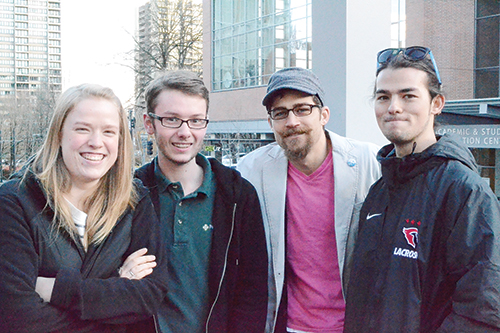Some lucky Portland State students will be spending spring break traveling, volunteering and making new friendships. “When I went on an alternative spring break trip my first time two years ago as a freshman, I made some of the best friends that I am still close to today,” said Erika Nielsen, a student leader for the group headed to Houston, Texas.
Student volunteers break away

Some lucky Portland State students will be spending spring break traveling, volunteering and making new friendships.
“When I went on an alternative spring break trip my first time two years ago as a freshman, I made some of the best friends that I am still close to today,” said Erika Nielsen, a student leader for the group headed to Houston, Texas.
This spring break, PSU’s Student Leaders for Service has organized for the fourth year in a row a volunteer-oriented alternative spring break option for students. From March 24–30, three groups of students will travel to Eastern Oregon, Houston and Northern California to volunteer with local communities and organizations.
This year is the first that one of the alternative spring break destinations is not on the West Coast and will require travel by plane, Nielson said. The students headed to Houston will work with Habitat for Humanity building homes while learning about affordable housing and construction.
The trip to Northern California will allow students to volunteer on a farm and learn about sustainable farming and agriculture, said Devon Burgoyne, one of the student leaders for this destination.
Another group of students is headed to Eastern Oregon.
“The focus will be on food and health equity and we will be working with rural communities,” said Grant Neely, a student leader.
What is impressive is that the trip is almost entirely student-planned and will consist of only students, Nielsen said. “It’s just a group of students getting together to give back to a
community.”
PSU’s motto is “Let knowledge serve the city.” While not necessarily serving this city, Oran Stainbrook, a leader of the Northern California trip, believes that the motto still applies.
“Alternative spring breaks help to embody our motto,” he said. “It is important to take our education out of the classroom and off campus and ideally out of this city, state or even country.”
“The alternative spring break is a good place for students to start who want to get involved in their community,” Neely said, explaining that once students return from these trips it is often easier to incorporate volunteer work into their daily lives.
Nielsen said that the spring break alternatives are a great opportunity to take a break from the self-centeredness that college can inspire.
“It is refreshing to focus on something outside of yourself,” she said.
Neely said that many may think of spring break and picture beach parties, drinking and MTV.
“Students will be gaining these valuable volunteer experiences during a time when people are normally just relaxing,” he said.
Stainbrook had his own way of describing the alternative spring break: “It’s the best break you’ll ever not get,” he said. While the trips entail a lot of work, with most days requiring four to six hours of volunteer time, the week is still fun and full of valuable experiences.
Beyond just traveling, these trips are incredibly beneficial for making new friendships, Neilson said. Students on the trip spend three meals a day together, bonding, and each trip schedules one day for sightseeing and exploring that is volunteer-free.
Another advantage is the opportunity to gain real-world experience in fields that PSU students are studying. Nielson noted that several engineering students are joining her in Houston and will apply the skills they have learned in the classroom to the homes that they will help construct.
Students on each trip will be required to write a reflection piece at the end of every day. As SLS gets better at organizing alternative spring breaks, Stainbrook hopes that there will be more pre- and post-term curriculum incorporated into the trips.
He also hopes that in the next few years students might create video blogs or web portfolios to supplement the written reflections and better illustrate the value of the trip to future participants.
Planning and organization for the three trips began in the early months of fall term.
One obstacle student organizers faced were cancellations by a few participants for one trip that was originally set for San Francisco. Instead, with too few members, SLS acted quickly and morphed two trips together, so that the students headed to San Francisco became part of the Northern California trip.
Also, as students would be flying for the first time, Nielsen said that the amount of necessary paperwork and preplanning was more work than she expected.
However, with nearly no help from faculty, the students of SLS managed to get through the application process as well as the food, lodging and travel logistics.
With the most expensive trip, to Houston, priced at $350—including food, lodging and travel—the alternative spring break may just be the most economical and humanitarian travel option for a PSU student.





